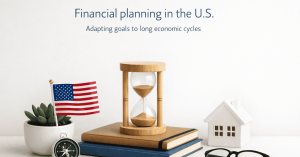In recent years, growing doubts about the reliability of Social Security have led many individuals to rethink how they prepare for the future. Economic fluctuations, longer life expectancies, and shifting government priorities have all contributed to an atmosphere of uncertainty. These factors make financial planning not only beneficial but essential for anyone seeking long-term security.
By starting early and taking control of personal finances, individuals can create a foundation that cushions them from unpredictable policy changes. Strategic financial planning allows for diversified investments, emergency savings, and personalized approaches that fit unique retirement goals. This proactive attitude builds independence and reduces the risks associated with external instability, fostering greater confidence about the years ahead.
Why Financial Planning Matters More Than Ever

The sustainability of Social Security remains in question as demographic changes strain the system. With fewer workers supporting more retirees, benefit reductions or delays could become inevitable. This reality makes financial planning a necessity rather than an option. Preparing alternative income sources ensures that retirees maintain their desired lifestyle even if government support weakens over time.
Effective financial planning involves setting realistic goals, managing debt, and maintaining healthy savings habits throughout one’s working years. It also requires a clear understanding of risk tolerance and long-term investment strategies. By forecasting future expenses such as healthcare, housing, and travel, individuals can better estimate how much money they’ll need to retire comfortably, regardless of policy changes.
Diversifying Income Sources for Long-Term Stability
Relying on a single stream of retirement income is no longer sustainable in today’s volatile environment. A solid financial planning strategy must focus on diversification to minimize risks and enhance security. This includes blending different types of assets and income sources to create a reliable financial foundation. Some of the most effective diversification strategies include:
- Contributing regularly to 401(k)s, IRAs, or similar retirement accounts
- Building a balanced investment portfolio of stocks, bonds, and mutual funds
- Exploring real estate or rental opportunities for passive income
- Establishing side businesses or digital revenue channels
By combining these diverse income sources, individuals can significantly strengthen their financial planning framework, creating a more stable and resilient foundation for retirement. This strategic diversification not only minimizes dependence on Social Security but also protects against market volatility and policy changes. With multiple revenue streams working together, retirees can enjoy a steady flow of income even during economic downturns.
Adapting Your Financial Strategy to Changing Realities
Since economic and political conditions can change rapidly, financial planning should remain flexible and responsive. Adjusting strategies in response to inflation, tax changes, or market volatility helps preserve long-term value. Consulting with a financial advisor is a wise step to ensure that investment allocations remain aligned with personal objectives and current realities.
Moreover, accounting for healthcare expenses and insurance premiums within your financial planning approach is crucial. These costs often increase with age and can easily disrupt retirement budgets if unprepared. Anticipating such expenses ensures greater peace of mind and financial control during retirement.
The Emotional Side of Financial Planning
Beyond numbers and investments, financial planning provides emotional stability. Having a clear roadmap helps reduce anxiety about future uncertainties and instills a sense of control. It transforms retirement from a period of financial worry into one of opportunity and fulfillment. With careful planning, retirees can enjoy their time without the stress of economic insecurity.
Education and consistency play key roles in maintaining this balance. Staying informed about markets and policy changes empowers individuals to make timely adjustments. Ultimately, financial planning builds both confidence and resilience, ensuring that life after work remains rewarding, secure, and filled with purpose.



